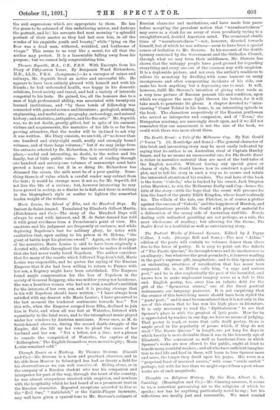The Poetical Works of Edmund Spenser. Edited by J. Payne
Collier. 5 vols. (George Bell and Sons.)—The new "Aldine" edition of the poets will contain no volumes dearer than these five to the lover of poetry. It is easy to point out the defects of " The Faerie Queene," its incompleteness and its incoherence as an allegory ; but whatever the great poem lacks, it is never wanting in the poet's supreme gift, imagination ; and to this Spenser adds an enchanting sweetness of versification that has never been surpassed. He is, as Milton calls him, "a sago and serious poet," and he is also emphatically the poet of the beautiful, and knows how to make unpleasant imagery serve as a foil to this end. English poetry, too, owes him an infinite debt for the gift of the " Spenserian stanza," one of the finest poetical instruments our language possesses. It is not surprising that the creator of this bewitching music should have been styled the " poets' poet ; " and it must be remembered that it is not only in the use of this stanza that he has won his high place in literature. It is only necessary to read the " Epithalamion " to see that Spenser's place is with the greatest of lyric poets. How far he is appreciated by readers in our day, we have no means of judging. That poetry is read, or verse that calls itself poetry, there is ample proof in the popularity of poems which, if they do not rival "The Faerie Queene" in length, are yet long for days in which brevity is more desirable than it was in the leisurely age of Elizabeth. The convenient as well as handsome form in which Spenser's works are now offered to the public, ought at least to benefit many youthful readers ; and all who have sufficient imagina- tion to find life and food in them, will learn to love Spenser more and more, the longer they dwell upon his pages. His verse is a "perpetual feast of noctared sweets," with some "crude surfeit" perhaps, but with far less than we might expect from a poet whose works are of such magnitude.


































 Previous page
Previous page